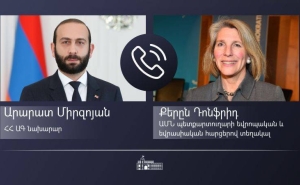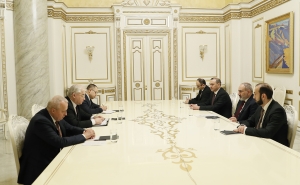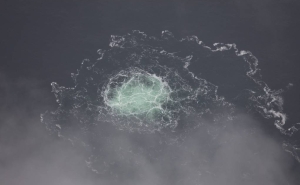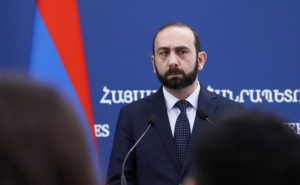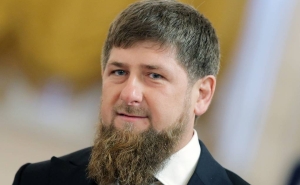 Where Do Russian and US Interests Clash?
Where Do Russian and US Interests Clash?
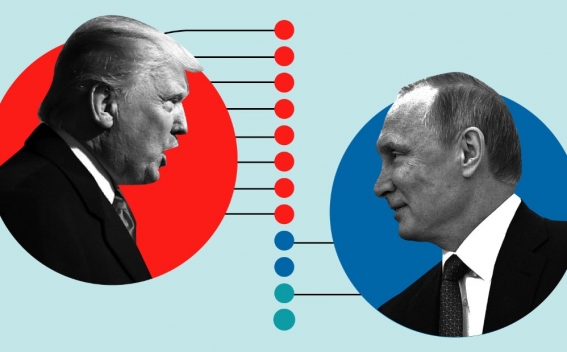
Recent developments in Russian-American relations were abrupt and unexpected for many, in the background of US President Donald Trump's team's statements aimed at improving relations with Russia. After the meeting between Russian President Vladimir Putin and US President Donald Trump at G20, which lasted for about 2 hours instead of half an hour, and after the parties positively estimated the meeting, many would expect positive developments in Russian-American relations. But expectations changed when Russia responded to the former US president Obama’s decision to deport 35 Russian diplomats, in turn demanding the US diplomatic corps in Russia to decrease from 1,300 to 455, thus making equal with the US, and US President signed the bill of the US Congress envisaging new sanctions against Russia.
Below we will try to understand what could happen in the Russian-American relations and why it happens during this very period.
Among the possible reasons, first of all, we should consider the domestic political situation in the US, particularly the contradictions between the Trump team and Congressmen, as well as Democrats and some Republicans. The sanctions imposed by the current bill cannot be abolished without the approval of the US Congress. A striking demonstration of these contradictions can be considered the bill envisaging sanctions against Russia, Iran and North Korea by which Congressmen eventually managed to limit the ability of the US executive power to regulate relations with the given countries and, if necessary, to mitigate sanctions. In the United States, accusing Trump of a pro-Russian policy, in the face of allegations of being a "Russian agent," eventually the adoption of such a bill was more than logical. Even if Trump did not sign the bill and used his veto right, the bill would allow the US Congress, in its turn, to use its veto right to circumvent the veto of the President. Therefore, Trump team finally approved the bill thus trying to soften the accusations against him and to avoid further steps by the Congress. It was no coincidence that after the bill was signed, Trump noted that he had taken that step to preserve the national unity.
In this context, Russia's reaction to the bill was not accidental. For example, after the adoption of sanctions, Russian Prime Minister Dmitry Medvedev said that they demonstrate the weakness of Trump’s administration and that the US Congress would take further steps to eventually impeach Trump.
As for potential foreign policy motives, in this case we see an uncertain picture. In the case of Syria and Ukraine, at least Russia and the US seem willing to cooperate. During the Trump-Putin meeting, the leaders of the two countries managed to come to an agreement on the ceasefire in the south-west of Syria. In addition, Tramp decided to halt the so-called moderate opposition in Syria who want to overthrow Assad by the US support.
As for the Ukrainian crisis, in this case, it seems, the sides are willing to cooperate, which was manifested by the appointment of a special representative from Trump Team in the negotiations on the Ukrainian crisis.
But the picture is different for other Eastern European countries. Since Trump’s Presidency, the United States has increased its military presence in Eastern Europe. At the beginning of the year, the United States moved to Poland the largest number of servicemen (3500 soldiers) since the collapse of the Soviet Union. It has recently become known that the US will sell to Romania $ 3.9 billion worth long-range missiles. This step was followed by a statement made by Donald Trump in Poland that the United States is planning to sell Poland $ 8 billion worth long-range missiles.
Last week US vice president Mike Pence visited Estonia (In Estonian capital Tallinn, after meeting Latvian, Lithuanian and Estonian presidents, Pence reiterated the US commitment to Article 5 of the NATO treaty, "the attack against one NATO member will be considered as an attack against all members"), Georgia and Montenegro. There was a clear change of US rhetoric towards Russia during the visit. Specifically, Trump’s signing the bill that imposed sanctions against Russia, was presented by Pence as proof of US readiness to defend its "European allies and friends".
Such a change in US rhetoric addressed to Russia can be explained by the following inner political motives:
In September, the Russian Federation plans to hold the so-called "Zapad" military exercises in Belarus and Russia, which, after the collapse of the Soviet Union, are claimed to be the largest military exercises in the region (according to Russian and Belarusian sources, 13,000 military personnel will participate, while Western sources speak about 60,000 to 100,000 military personnel).
In addition, it seems that the economic interests in Eastern Europe of the United States and Russia clash as well. During the visit of the US President to Poland, where he met with the leaders of the "Three Seas Countries" (Poland, Hungary, the Czech Republic, Slovakia, Romania, Bulgaria, Lithuania, Estonia, Latvia, Croatia, Slovenia, Austria), Trump paid great attention to the gas supply to Eastern Europe noting that the US will eliminate the obstacles in the energy sector, particularly the energy monopoly in the region (considering the dependence of the Eastern European countries on Russian gas). It was no coincidence that after anti-Russian sanctions were imposed, Russian Prime Minister Dmitry Medvedev said that the United States thus announced Russia "a large-scale trade war".
The point is that sanctions against Russia will hamper the successful exploitation of the North Stream 2 project. The project aims at bringing gas from Russia to the Baltic Sea, directly from Germany, bypassing Ukraine. The project was opposed by 9 EU Member States: Croatia, the Czech Republic, Estonia, Hungary, Latvia, Lithuania, Poland, Slovakia and Romania, who believe that the project will increase EU dependence on Russia. In turn, Germany and Austria are in favor of this project, as German and Austrian companies have already invested money in the framework of the North Stream 2 project. It's no coincidence that these countries are against the US new sanctions against Russia.
Thus, this new wave of tension in the Russia-US relations can be explained by a number of factors, both domestic and foreign, which are based on the conflict and clash of the political and economic interests and attitudes of internal and external actors.
Other materials on this subject
- Turkey is sending Cold War-era cluster bombs to Ukraine – FP The weapons are designed to destroy tanks by bursting into smaller submunitions, which can linger on the battlefield for years if they do not immediately explode. Each round scatters about 88 bomblets.
- Los Angeles mayor and city council president address US president on Lachin corridor issue Thank you, Mayor Bass, for joining me in communicating to President Biden the urgent need for U.S. leadership to lift the blockade and bring humanitarian relief to the people of Artsakh.
- US Committed to Helping Armenia and Azerbaijan Resolve Issues Peacefully: Blinken Spoke With Pashinyan The Secretary reiterated our commitment to helping Armenia and Azerbaijan resolve issues peacefully.
- Iran to Submit Final Conclusion Over Nuclear Deal Revival by Midnight In comments on Monday, Amirabdollahian said Iran is going to send its final conclusion about the JCPOA talks to the European coordinator in written form at midnight.
- Erdogan, Biden Might Meet in September- Media Turkey plans to buy 40 F-16 fighter jets from the US and upgrade another eighty. US President Joe Biden stated that he expects to receive the approval of the [US] Congress to sell F-16 fighter jets to...
-
 17:08
17:08The regular session of the Anti-corruption Policy Council takes place in Jermuk
-
 15:05
15:05The Prime Minister sends congratulatory messages to the supreme leader of Iran and the President of Iran
-
 11:11
11:11Armenia sends earthquake aid to Turkey
-
 10:43
10:43Commemoration of the Pontiff St. Sahak Partev
-
 09:16
09:16Some roads are closed and difficult to pass in Armenia
-
 19:55
19:55Phone conversation of the Foreign Minister of Armenia with the U.S. Assistant Secretary of State for European and Eurasian Affairs
-
 18:30
18:30Prime Minister Pashinyan and President Khachaturyan meet
-
 18:20
18:20Ararat Mirzoyan with Co-Chairman of the OSCE Minsk Group of France Brice Roquefeuil
-
 17:01
17:01Humans could land on Mars within 10 years, Musk predicts
-
 16:45
16:45France, US urge 'immediate' end to Nagorno Karabakh blockade
-
 16:01
16:01Blockaded Nagorno Karabakh launches fundraiser to support quake-hit Syria
-
 15:59
15:59Earthquake death toll in Turkey rises to 18,342
-
 15:43
15:43Ararat Mirzoyan Held a Telephone Conversation with Sergey Lavrov
-
 15:06
15:06French president rules out fighter jet supplies to Ukraine in near future
-
 14:47
14:475 Day Weather Forecast in Armenia
-
 14:44
14:44President Vahagn Khachaturyan wrote a note in the book of condolences opened in the Embassy of Syria in Armenia
-
 14:20
14:20Azerbaijan’s provocations impede establishment of peace and stability – Armenian FM tells Russian Co-Chair of OSCE MG
-
 12:57
12:57France representation to OSCE: Paris calls on Azerbaijan to restore freedom of movement through Lachin corridor
-
 11:40
11:40Command of Kosovo forces highly appreciated preparation of Armenian peacekeepers
-
 10:16
10:16The United States withdrew from sanctions against Syria for six months the provision of assistance after the earthquake
day
week
month
Humidity: %
Wind: km/h


